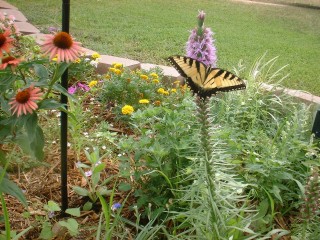|
Gardens Ablaze |
||
|
|
Organics
& Non-Chemical Solutions
|
|
|
Site Map
Home
|
Poisoning the landscape to rid it of pests in our gardens is very ill-advised. There are many ways to get around using chemical pesticides in the landscape, including Companion Planting and natural biological controls. Providing a home for birds and beneficial insects will greatly reduce the need for pesticides in the garden. Studies have shown that the presence of many species of birds in the garden is a sure sign of a healthy environment. Poisoning the plants and ground to remove what you perceive as pests also remove their food sources - and they will move on to more amenable territories. A garden is not worth much if there are no bird songs to be heard in it. Using chemicals in the ground might solve some temporary problems, but when you add chemicals to your soil, you are just adding to the global problem of making the soil inert and causing erosion and pollution of our ground water. Adding compost is just as easy, and keeps the soil full of beneficial microorganisms that will in the end enhance your crops despite whatever pest it was that you were trying to eradicate in the first place. Using nature's secrets to combat problems in the landscape is more gratifying personally to the gardener than buying a pre-mixed chemical from the store and poisoning our properties. Most of us garden for fun, and it's a lot more fun to watch the fruits of your efforts if you're not committing mass destruction of the natural order to achieve them. It is up to us to preserve this fragile earth for our children, grandchildren, and generations to come. We don't have to be active participants in this throw-away world, when just little actions like Companion Planting and Composting can make such a big difference. This is something we need to teach our kids now, so that they will take it into the future to pass along to their kids. It is worth noting here that organic gardening is a black-and-white scenario for any gardener, with no gray areas. If you use any chemical such as Round-up, even just in the cracks of the driveway, then you are not an organic gardener. True organic gardens suffer NO pesticide use whatsoever, and that's the perfect world we should all aim for. In this section, we will cover the how-to's of gardening organically, and will supply many hands-on examples of how others solve problems in their gardens without the use of pesticides. This is a work in progress, so please feel free to browse other sections of this site as we do the necessary research.
|
|
|
Gardens Ablaze |
||
 We
can change the world, one home at a time. This is the basis for organic
gardening. Most of us, as gardeners, use some chemicals because they
are readily available, relatively easy to use, and save time and labor.
But are these good reasons for decimating our earth with chemicals and pollution?
The answer has to be a resounding NO! Common chemical pesticides have
been strongly linked to many human ailments, including cancer, reproductive
disorders, neurological symptoms, and a string of other health issues.
We
can change the world, one home at a time. This is the basis for organic
gardening. Most of us, as gardeners, use some chemicals because they
are readily available, relatively easy to use, and save time and labor.
But are these good reasons for decimating our earth with chemicals and pollution?
The answer has to be a resounding NO! Common chemical pesticides have
been strongly linked to many human ailments, including cancer, reproductive
disorders, neurological symptoms, and a string of other health issues.